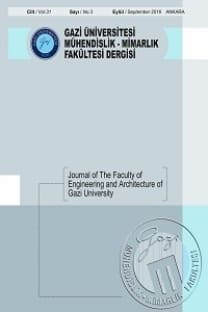Hazırlık zamanlarının öğrenme etkili olduğu durumda bir akış tipi çizelgeleme problemi
Çizelgeleme problemleri ile ilgili yapılan çalışmalarda genellikle işlerin hazırlık zamanları ya ihmal edilmiş ya da işlem zamanına dahil edilerek çözüm yaklaşımları geliştirilmiştir. Ancak bazı üretim sistemlerinde hazırlık zamanları ihmal edilmeyecek kadar önemli olabileceği gibi işlem zamanlarını da hazırlık zamanlarından ayrı düşünmek gerekebilir. Üretim sistemlerinde işler genellikle otomatik makine işlemlerine göre yapıldığı için işlem zamanları işlem sırasına göre bir değişiklik göstermemektedir. Fakat hazırlık zamanları söz konusu olduğunda insan faktörü devreye girdiği için hazırlık işlemlerinin sık sık tekrarlanmasıyla hazırlık zamanlarında gittikçe bir azalma olmaktadır. Bu olgu çizelgeleme literatüründe öğrenme etkisi olarak tanımlanmaktadır. Bu çalışmada iki-makineli akış tipi çizelgeleme problemi, hazırlık zamanlarının öğrenme etkili olduğu durum için incelenecektir. Çizelgeleme literatüründe oldukça önemli yer tutan toplam tamamlanma zamanı performans ölçütü olarak ele alınmıştır. Problem için bir matematiksel programlama yaklaşımı geliştirilerek farklı hazırlık zaman aralıkları ve öğrenme etkilerine göre sonuçlar karşılaştırılmıştır. Ayrıca büyük boyutlu problemler için sezgisel yaklaşımlar da geliştirilerek deneysel sonuçlar gösterilmiştir.
Setup times with a learning effect in flowshop scheduling problem
Relevant to recent scheduling studies, setup times of jobs have generally been either neglected or considered in processing times. But, in some production systems the setup times may be so large that it can not be neglected but should be considered separately from processing times. In production systems, since jobs are generally processed on automated machines, job processing times are independent of the sequence of jobs. When the setup times are taken into account, there will be a gradual decline in their magnitudes due to the repetition of setup procedures by human operators. This phenomenon is known as the learning effect in scheduling analysis. In this study, a two-machine flow-shop scheduling problem with learning effect setup times is considered. A mathematical programming model is developed for the problem and according to different setup time ranges and learning effects, computational results are compared. Additionally, heuristic approaches are presented and experimental results are given for large size problems.
___
- 1. Eren, T. ve Güner, E., “Paralel makineli çizelgeleme probleminde öğrenme etkili hazırlık zamanları”, Huten, Cilt 2, Sayı 4, s. 67-72, 2006.
- 2. Bagga, P.C. ve Khurana, K., “Two-machine flowshop with separated sequence-independent setup times: mean completion time criterion”,Indian Journal of Management and Systems, Volume 2, pp. 47-57, 1986.
- 3. Aldowaisan, T. ve Allahverdi, A., “Total flowtime in no-wait flowshops with separated setup times”, Computers & Operations Research, Volume 25(9), pp. 757-765, 1998.
- 4. Allahverdi, A., “Minimizing mean flowtime in a two-machine flowshop with sequence-independent setup times”, Computers & Operations Research, Volume 27(2), pp. 111-127, 2000.
- 5. Allahverdi, A. ve Aldowaisan, T., “No-wait and separate setup three-machine flowshop with total completion time criterion”, International Transactions in Operational Research,Volume 7(3), pp. 245-264, 2000.
- 6. Aldowaisan, T., “A new heuristic and dominance relations for no-wait flowshops with setups”, Computers & Operations Research,Volume 28(6), pp. 563-584, 2001.
- 7. Allahverdi, A. Ve Gupta, J.N.D. and Aldowaisan, T., “A review of scheduling research involving setup considerations”,Omega, 27: pp.219-239, 1999.
- 8. Yang, W.–H. ve Liao, C.–J., “Survey of scheduling reseach involving setup times”,International Journal of Systems Science, 30(2): 143-155, 1999.
- 9. Cheng, T.C.E., Gupta, J.N.D. ve Wang, G., “A review of flowshop scheduling research with setup times”, Production and Operations Management, 9 (3): 262-282, 2000.
- 10. Eren, T. ve Güner, E., “Akış tipi çizelgeleme problemlerinde işe-bağımlı öğrenme etkisi”,K.H.O. Savunma Bilimleri Dergisi, Cilt 2(2),s.1-11, 2003.
- 11. Eren, T. ve Güner, E., “Öğrenme etkili akış tipi çizelgeleme probleminde ortalama akış zamanının enküçüklenmesi”, Gazi Üniversitesi Mühendislik Mimarlık Fakültesi Dergisi, Cilt 19(2), s. 119-124, 2004.
- 12. Lee W.-C. ve Wu C.-C. “Minimizing total completion time in a two-machine flowshop with a learning effect”, International Journal of Production Economics, Volume 88, pp. 85–93, 2004.
- 13. Koulamas C. ve Kyparisis, G.J. “Single-machine scheduling problems with past-sequence-dependent setup times” European Journal of Operational Research, in press, 2006.
- 14. Garey, M.R., Johnson, D.S. ve Sethi, R., “The complexity of flowshop and jobshop scheduling”, Mathematics of Operations Research, Volume 1(2), pp. 117-129, 1976.
- 15. Nawaz, M., Enscore, E.E. ve Ham, I., “A heuristic algorithm for the m-machine, n-job flow-shop sequencing problem”, Omega,Volume 11, pp. 91–95, 1983.
- 16. Glover F., “Future paths for integer programming and links to artificial intelligence”,Computers and Operations Research, Volume 5, pp. 533-549, 1986.
- 17. Jang, J.–S.R., Sun, C.T. ve Mizutani, E., Neuro-fuzzy and soft computing: A computational approach to learning and machine intelligence,Prentice Hall, USA, 1997.
- 18. Fox, R.L., Optimization methods for engineering design,Addision Wesley Publishing Company, London, 1971.
- ISSN: 1300-1884
- Yayın Aralığı: Yılda 4 Sayı
- Başlangıç: 1986
- Yayıncı: Oğuzhan YILMAZ
Sayıdaki Diğer Makaleler
SİLOPİ ASFALTİTİNİN YARI KESİKLİ REAKTÖRDE PİROLİZİ
Melike SEZER, Ali KARADUMAN, Ali Y. BİLGESÜ
Adana Tepebağ'daki tarihi yerleşim dokusunun incelenmesi, koruma sorunları ve öneriler
Payaslı Gülin OĞUZ, Işık AKSULU
ANADOLU KONUT YERLEŞİM DESENİNDE İKİLİ OLUŞUM ANKARA BATIKENT-ERGAZİ ÖRNEĞİ
MİMARLIK TASARIMI PARADİGMASINDA BİOMİMESİS’İN ETKİSİ
Semra ARSLAN SELÇUK, Arzu GÖNENÇ SORGUÇ
BARİT AGREGALI AĞIR BETONLARIN RADYASYON ZIRHLAMA AMACIYLA KULLANIMININ ARAŞTIRILMASI
Şemsettin KILINÇARSLAN, Celalettin BAŞYİĞİT, İskender AKKURT
WEB ATAKLARI İÇİN METİN TABANLI ANORMALLİK TESPİTİ (WAMTAT)
Hidayet TAKCI, Turker AKYUZ, İbrahim SOGUKPINAR
Sargılı beton davranışının betonarme eleman ve sistem davranışına etkisi
